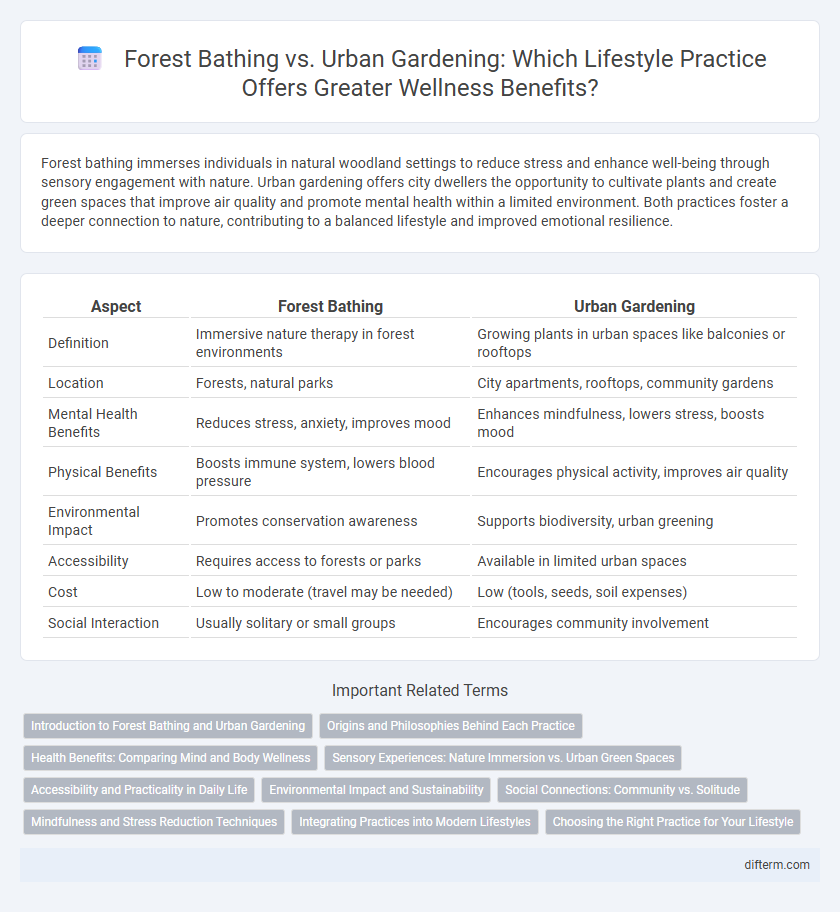Forest bathing immerses individuals in natural woodland settings to reduce stress and enhance well-being through sensory engagement with nature. Urban gardening offers city dwellers the opportunity to cultivate plants and create green spaces that improve air quality and promote mental health within a limited environment. Both practices foster a deeper connection to nature, contributing to a balanced lifestyle and improved emotional resilience.
Table of Comparison
| Aspect | Forest Bathing | Urban Gardening |
|---|---|---|
| Definition | Immersive nature therapy in forest environments | Growing plants in urban spaces like balconies or rooftops |
| Location | Forests, natural parks | City apartments, rooftops, community gardens |
| Mental Health Benefits | Reduces stress, anxiety, improves mood | Enhances mindfulness, lowers stress, boosts mood |
| Physical Benefits | Boosts immune system, lowers blood pressure | Encourages physical activity, improves air quality |
| Environmental Impact | Promotes conservation awareness | Supports biodiversity, urban greening |
| Accessibility | Requires access to forests or parks | Available in limited urban spaces |
| Cost | Low to moderate (travel may be needed) | Low (tools, seeds, soil expenses) |
| Social Interaction | Usually solitary or small groups | Encourages community involvement |
Introduction to Forest Bathing and Urban Gardening
Forest bathing, also known as Shinrin-yoku, involves immersing oneself in natural forest environments to reduce stress and improve mental health through sensory experiences. Urban gardening transforms city spaces into green oases where residents cultivate plants, enhancing local biodiversity and promoting sustainable living. Both practices offer distinct benefits by connecting individuals with nature, either through deep immersion in forests or active cultivation of urban green spaces.
Origins and Philosophies Behind Each Practice
Forest bathing, originating from Japan in the 1980s, emphasizes immersive sensory experiences in natural woodlands to promote mental and physical well-being through a deep connection with nature. Urban gardening, rooted in ancient civilizations but revitalized in modern cities, focuses on cultivating plants within urban environments to foster sustainability, food security, and community engagement. Both practices share a philosophy of enhancing human health by reconnecting with the natural world, yet forest bathing prioritizes passive mindfulness in existing natural settings, while urban gardening involves active cultivation and environmental stewardship.
Health Benefits: Comparing Mind and Body Wellness
Forest bathing enhances mental well-being by reducing stress hormones and lowering blood pressure through immersion in natural forest environments. Urban gardening promotes physical activity, improves mood, and increases exposure to sunlight, which boosts vitamin D levels essential for bone health. Both practices contribute to overall mind and body wellness by fostering relaxation, improving air quality, and encouraging mindfulness in different settings.
Sensory Experiences: Nature Immersion vs. Urban Green Spaces
Forest bathing offers deep sensory immersion through the sounds of rustling leaves, the scent of pine, and the tactile feel of moss, promoting profound relaxation and mindfulness. Urban gardening provides a tactile connection to green spaces amid city life, engaging sight, touch, and smell by cultivating plants and flowers in small, accessible environments. Both practices enhance well-being by fostering sensory engagement with nature, though forest bathing delivers a more immersive experience, while urban gardening integrates greenery into daily urban routines.
Accessibility and Practicality in Daily Life
Forest bathing offers deep natural immersion but can be limited by location and time constraints for many urban dwellers. Urban gardening provides a highly accessible and practical way to connect with nature daily, utilizing small spaces like balconies or windowsills. This approach enables consistent engagement with greenery, promoting mental wellness without the need for long travel or specialized settings.
Environmental Impact and Sustainability
Forest bathing enhances environmental sustainability by promoting the preservation of natural ecosystems, increasing biodiversity, and improving air quality through native vegetation. Urban gardening contributes to environmental health by reducing carbon footprints, mitigating urban heat islands, and recycling organic waste, leading to localized resource efficiency. Both practices support sustainable living but differ in scale and direct impact on natural habitats versus urban environments.
Social Connections: Community vs. Solitude
Forest bathing fosters deep social connections through shared experiences in nature, enhancing group mindfulness and collective well-being. Urban gardening, while often practiced alone, offers opportunities for community bonding at local garden plots or plant swaps, supporting social interaction amidst solitude. Both activities uniquely blend solitude and social engagement, promoting mental health and a sense of belonging.
Mindfulness and Stress Reduction Techniques
Forest bathing immerses individuals in natural woodland environments, promoting mindfulness through sensory engagement and reducing cortisol levels linked to stress. Urban gardening offers accessible green spaces within city settings, enhancing focus and emotional well-being by fostering connection with plant life and routine care. Both practices utilize nature-based mindfulness to alleviate anxiety and improve psychological resilience.
Integrating Practices into Modern Lifestyles
Forest bathing enhances mental well-being by immersing individuals in natural woodland environments, reducing stress through sensory engagement with flora and fauna. Urban gardening promotes sustainable living and increases access to fresh produce, fostering a direct connection to nature within city settings. Integrating both practices into modern lifestyles offers a balanced approach to nature therapy and ecological responsibility, improving physical health and emotional resilience.
Choosing the Right Practice for Your Lifestyle
Forest bathing immerses you in nature to reduce stress and improve mental clarity, ideal for those seeking deep relaxation and quietude away from city noise. Urban gardening offers hands-on engagement with plants in small spaces, perfect for busy individuals wanting to boost mood and nutrition without leaving the city. Choosing between these depends on your access to natural environments and daily schedule, balancing tranquility with convenience.
Forest Bathing vs Urban Gardening Infographic

 difterm.com
difterm.com